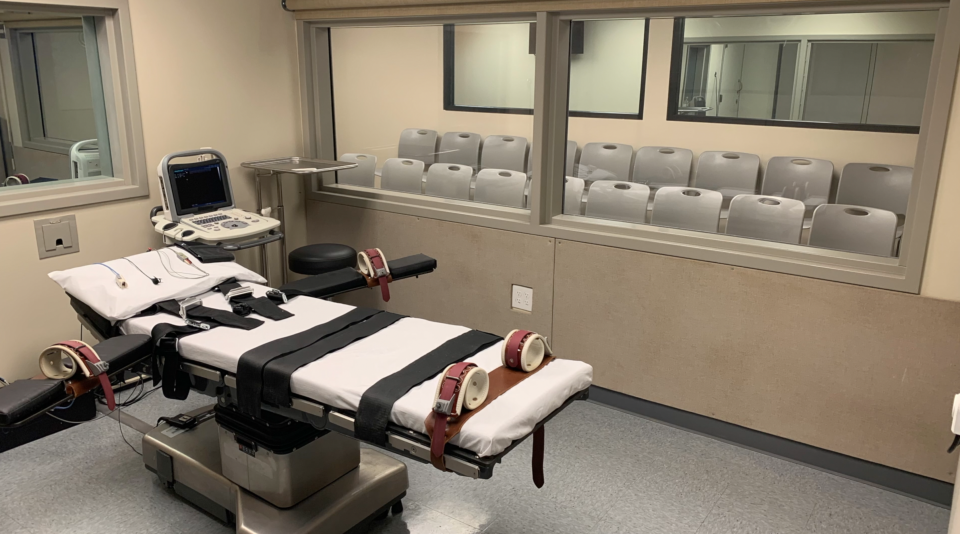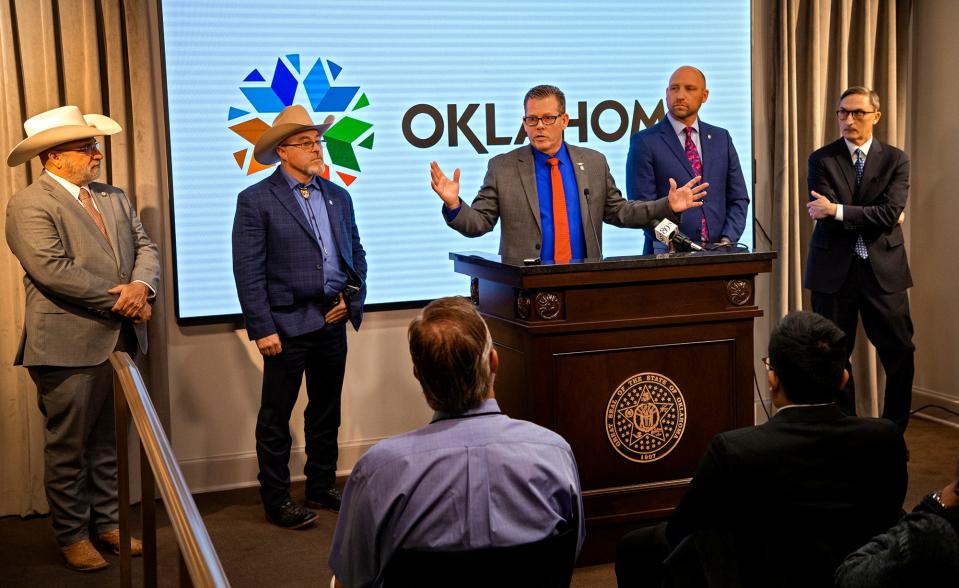First prison wife of death row inmate Richard Glossip says he "used me for financial gain"
In a sworn statement sent to the Oklahoma Pardon and Parole Board, the first prison wife of death row inmate Richard Glossip wrote that she feels used and "did not get anything out of the relationship."
"Glossip, on the other hand, got exactly what he wanted, which was financing for himself while in prison," Leigha Joy Jurasik stated in the affidavit signed Wednesday in New Jersey.
Their wedding in September 2018 at the Oklahoma State Penitentiary in McAlester became international news. The marriage was dissolved without fanfare in February 2021.

She revealed in the affidavit that she spent $7,000 on Glossip and another $1,000 on other death row inmates at his request. "He only thought of himself," she wrote. "Glossip was controlling and manipulative and used me for financial gain."
More:'When they stop serving last meals, we'll stop reporting it.' Oklahoma death row custom stirs debate
Death row inmate Richard Glossip to appear before Parole Board next week for clemency hearing
Glossip, 59, is set to be executed Sept. 22 for the murder of his boss, Oklahoma City motel owner Barry Van Treese. The Oklahoma Pardon and Parole Board meets Aug. 23 to decide whether to recommend Glossip for clemency. He claims he is innocent.
That claim has received widespread support, most recently from conservative pro-death penalty legislators in Oklahoma. One outspoken supporter, state Rep. Kevin McDugle, R-Broken Arrow, has vowed to fight to abolish the death penalty in the state if Glossip is executed.

Attorney General John O'Connor and his assistants included affidavits from Jurasik and another woman, along with graphic crime scene photos, in their packet to the parole board.
"Glossip does not ask for mercy; he asks for vindication," the state attorneys wrote. "The media might ignore portions of the evidence. Politicians might question the reliability of the outcome. Public opinion might claim certain witnesses cannot be believed. But for this Board, the facts of this case cannot be changed.
"Glossip orchestrated the murder of Barry Van Treese. A jury sentenced him to death. This Board must see that justice is done."
The victim was found beaten to death in Room 102 of his motel the Best Budget Inn on Jan. 7. 1997. Van Treese was 54 and lived in Lawton.
A motel maintenance man, Justin Sneed, confessed to killing the owner with a baseball bat. He said Glossip pressured him into doing it and offered him $10,000 as payment.
Sneed also said Glossip was worried about being fired when Van Treese discovered motel rooms had not been remodeled.
Richard Glossip's defenders claim he is an innocent victim of a faulty justice system
Glossip was first sent to death row after being convicted in 1998. The Oklahoma Court of Criminal Appeals ordered a new murder trial because his defense attorney failed to represent him adequately. He was sent to death row again after a 2004 retrial.
His attorneys contend the maintenance man killed the motel owner during a botched robbery for drug money and lied about Glossip to avoid the death penalty. They claim Sneed, a meth addict, made admissions in jail and later in prison about framing Glossip.
One prisoner reported Sneed openly bragged multiple times about the deal he had made to save his life and that Glossip had not done anything, the attorneys said. Sneed, now 44, is serving a life sentence without the possibility of parole.
"Richard Glossip is an innocent man who has been the victim of a massive breakdown in the justice system that would have been disturbing had it occurred even in a minor case." his attorneys told the Pardon and Parole Board in their packet.
"Police are supposed to investigate cases objectively and thoroughly rather than jumping to conclusions and resting on their first theory," Glossip's attorneys wrote. "The State is supposed to provide competent lawyers to zealously represent indigent defendants’ interests, which includes investigating the case and testing the prosecution’s evidence.Prosecutors are supposed to ensure that the evidence they present is reliable, to safeguard the evidence in the case rather than destroying it, and to proceed with a prosecution only when it is consistent with justice.
"None of these things happened in this case."
Glossip's ex-wife claims she was threatened after their relationship was over
In her affidavit, Jurasik wrote that she first wrote Glossip in July 2017 after seeing a documentary about his case. State attorneys have criticized the documentary, "Killing Richard Glossip," as obviously slanted in his favor and inaccurate.
"At the time, I was 20 years old and Glossip was 54," she wrote. "He told me he loved me during one of our first few phone calls with each other, and he started talking about marriage and a wedding very early on. During those conversations, Glossip told me he would be getting out of prison soon."
She wrote that Glossip would throw temper tantrums during phone calls and at times threaten to even kill himself to get her to give in to "whatever demand he was making."
Jurasik, now 25, also wrote that he stirred up animosity toward her "among his online following" after their relationship ended. "My mother and I received death threats from some of them. Glossip also sent me a letter stating that I was going to jail and that police were going to investigate me."
Former Glossip supporter now says she believes he is guilty
Also calling Glossip manipulative was Melissa Ratliff who first sent him a post card of support in 2015 after seeing an episode on the TV show, "Dr. Phil," about his innocence claim.
"Glossip knew I was passionate about issues of innocence and the death penalty and took full advantage of that," Ratliff wrote in an affidavit signed Aug. 4 in West Virginia.
She wrote they reconnected in 2020 and spoke up to seven times a day by phone for six months. She wrote she put thousands of dollars in the accounts of Glossip and other death row inmates at his request.
"Once in 2020, I expressed some concern about the amount of money that I was sending Glossip," she wrote. "Glossip made ugly comments to me, suggesting that I need not worry whether he had anything to eat. I, of course, wanted him to eat, so I kept sending money."
She wrote she ended the relationship in January 2021 and now believes Glossip is guilty. She wrote he sent her a letter in May 2021 threatening to destroy her career and have her investigated by the Department of Corrections.
"There is a considerable amount of shame and embarrassment I feel for the time I spent dedicated to Glossip," she wrote. "I am happy to say I am no longer controlled by his tactics."
Glossip in March married another woman who is opposed to the death penalty
Glossip married again in prison in March. His new bride is Lea Rodger, a law student from Florida and anti-death penalty advocate.
“For Rich, surviving three execution attempts, possibly facing a fourth, the one thing he’s really taken away from that is: Don’t take anything for granted ... really live in the moment,” Rodger told The Associated Press.
Glossip's attorneys also are challenging his conviction again at the Oklahoma Court of Criminal Appeals. They have told the court they have new evidence of his innocence.
The number of legislators calling for an evidentiary hearing has grown to 62.
Among the new evidence is a 2007 handwritten letter from Sneed to his defense attorney. "It was a mistake," he wrote. "Reliving this."
He also wrote there were a lot of things "eating at me" and some things "I need to clean up."
In a news release last week, McDugle called the letter "compelling new evidence that strongly supports what we heard, that Sneed wanted to recant his statement implicating Richard Glossip and his attorney shut him down."

In a response to Sneed's letter, Gina Walker, then an Oklahoma County assistant public defender, wrote that she knew it was very hard for him to testify at the second trial. Walker, who is now dead, also wrote she knew Glossip's lawyers "tried to talk you out of it."
"Had you refused, you would most likely be on death row right now," she wrote. "I hope he has not or his lawyers have not tried to make you feel responsible for the outcome of his case and his decisions."
Attorneys for the state dispute the letter is proof Sneed considered recanting.
This article originally appeared on Oklahoman: First prison wife of death row inmate Richard Glossip says he used her

